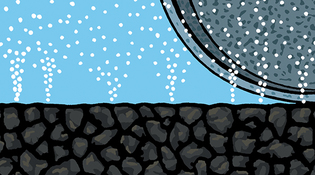
Gregory Nemec
The roads we drive on—not only our vehicles—are a source of air pollution. By heating fresh asphalt to various temperatures, Yale environmental engineer Drew Gentner and colleagues found that it emits volatile and semivolatile organic compounds that are a source of air pollutants in urban areas, especially on hot and sunny days. They found also that, over time, emissions at summer temperatures leveled out, but still persisted at a steady rate—suggesting the potential for long-term emissions from asphalt in real-world conditions.
The misery of the common cold may have an upside. Yale researchers have found that rhinovirus, the most frequent cause of common colds, can prevent the flu virus from infecting airways. A team led by Ellen Foxman ’93 of the School of Medicine created human airway epithelial tissue that they exposed to rhinovirus. The influenza virus was unable to infect the rhinovirus-exposed tissue, with the effect lasting for several days. The rhinovirus triggered part of the early immune system response to pathogens. Foxman’s lab has begun to study whether the cold virus could offer protection against COVID-19.
Quick identification of the type and severity of a stroke, usually done with MRI (magnetic resonance imaging), is critical to determining correct treatment. Because conventional MRI systems require strict, access-controlled environments and rigid safety precautions, patients—often critically ill—must be transported to hospital imaging suites. A team led by Kevin Sheth, a critical-care neurologist at Yale, collaborated with doctors and engineers from Connecticut-based Hyperfine to develop a portable MRI machine that can be safely operated in any room.
 loading
loading